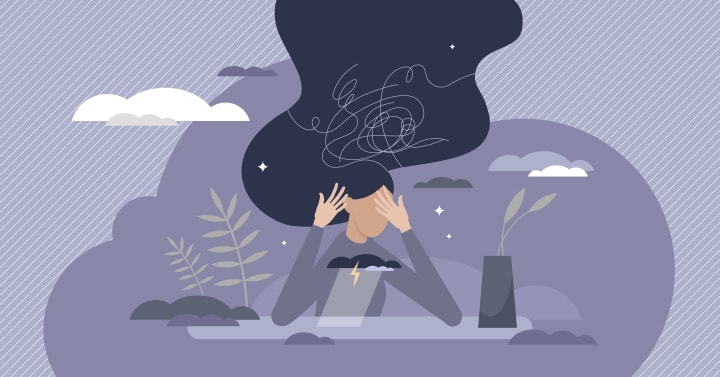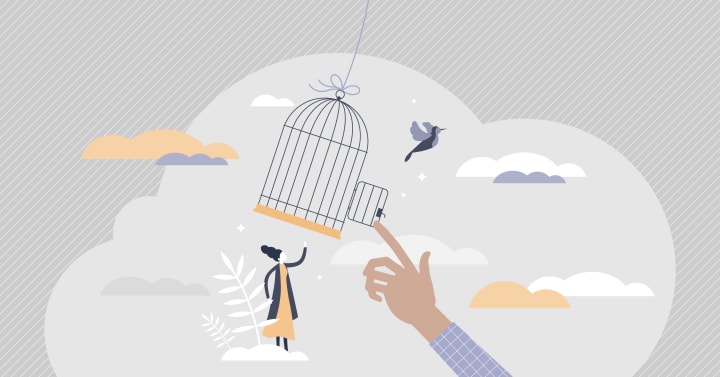What Failure Taught Me About Patience
After years of feeling disappointed, I realized I needed to change something.

“Success is most often achieved by those who don't know that failure is inevitable.”
— Coco Chanel
A lot of things have been said about failure and patience. "Change doesn’t happen overnight," "Rome was built in a day," and so on — are you sick to death of these platitudes when you’re running at a sprint to achieve your goals?
When you’re desperate for something, every day that goes by when you don’t have it seems like a lengthy nightmare. When you finally achieve it, it feels good. The euphoria lasts for a while.
However, inevitably, you find yourself wishing that you just could have achieved it sooner to reap the benefits sooner.
It’s easy to find yourself hating the past or wishing that the present had come five years sooner.

“Patience is the calm acceptance that things can happen in a different order than the one you have in your mind.”
— David G. Allen
However, this isn’t a productive place to leave your mind. If you’re constantly in a state of “could have, should have, would have,” you’re never going to be able to advance.
Achieving things is better than not achieving anything, sure. Yet even after you’ve climbed up the mountain, you still have to climb back down. You’ve got to stay happy with your achievement and not question how you could have done it sooner.
You’ve got to find beauty in your journey; even if you have to flip over a lot of rocks and boulders to find it.

Look for beauty in the past, even in the hardships. There are so many platitudes out there of how difficult circumstances form people and while that’s true, circumstances that are too difficult just damage people. There’s no getting around there.
We all have events that formed us, we all have other events that damaged us.
On the flip side of things, while it’s important to make peace with the disappointments of the past, it’s also important not to slip into longing for the positive parts of the past.
Being present is vital to feeling satisfied with where you are today.

According to psychology, we have something called hindsight bias. Psychology Today warns us to beware the hindsight bias and how it can make us overconfident.
“Hindsight bias, also known as the “knew-it-all-along effect”, is the inclination to see events that have already occurred as being more predictable than they were before they took place.”
It’s easy to fall into hindsight bias with our accomplishments. Here are two simple examples.
“I knew I’d get this job, the interview went great. Why didn’t I make this move sooner?”
In reality, you were terrified it went terribly and had no idea, all impediments that help you back from trying sooner.
“I knew I could finish the book, I should have started writing sooner and written two in that time frame.”
In reality, you couldn’t handle finishing the book any sooner than you did, but that memory starts to fade. Discounting our achievements and lamenting what we could have done better in the past is, quite frankly, a waste of thought.
Your mind will only focus on the bad memories and failures if you let it.

I’ve had ups and downs in my personal life and career — particularly for a three year period that left me in a crippling depression — so I can tell you fully well how difficult that can be.
Psychology has come a long way in explaining our thoughts, our feelings, and just how darn complicated all of that is. There’s nothing simple about it.
There’s a fun thing in psychology called mood-state dependent memory. It’s a double-edged sword; if you’re happy, your mind will summon up happy memories. If you’re feeling down, your mind will be a little snot and summon up unhappy memories of failures or shortcomings.
Psychologist World has some easy examples of how this works with emotions and memory.
“In a joyous mood, we may be able to better remember past events that brought joy to us.
For example, whilst on a beach, you may be able to recall happy memories of a memorable family gathering over a negative event. In contrast but following the same principle, whilst in a low mood, you may recall sad memories more easily.”
When we’re feeling a certain emotion, our minds are wired to think of other moments or other things that will summon up that same emotion. This is a double-edged sword, since if you’re happy, this is great. If you’re feeling low or if you’re depressed, this just makes it harder to fight the downward spiral.
You musn't lose yourself to living in the shadow of your unmet goals.

“Patience is not the ability to wait, but the ability to keep a good attitude while waiting.” — Anonymous
When I first thought about this, I was sitting in Madison Square Park in New York City. It was a spring day, early in the morning. I had an hour of blocked off writing time before I had to head into the office. It was a perfect, beautiful day.
But all I could think about is that I wish this had become my life five years ago.
I’m working in New York City, albeit being remote at the moment. I’m writing all the time. In the last twelve months, I’ve made more progress on my fiction, poetry, and non-fiction than I have in years.
Though I achieved something I desperately longed for — a stable, creative job I enjoy and time to write — I get lost in the wish that this could have happened sooner. After all, if it had, imagine how much more I’d have accomplished by now.
Dwelling on what you haven't achieved will only slow you down — focus on the good.

I’m trying not to think that way, about how much farther I'd be in life if I hadn't been slowed down by bumps in the road. I’m trying to remind myself that there was no possible way for this to have become my life any sooner than it did. I had to walk a winding road, I had to explore different plans, new jobs, and learn how to deal with all sorts of different people to be where I am today.
It’s okay not to be the person you visualized yourself as or to let your goals change. Five years ago, I thought I’d be in the third year of my PhD right now. The truth is, I’ve realized that my academic pedigree is too weak to get me into a PhD program without having a master’s first. This is just one of many life benchmarks that I visualized for myself that has yet to come to fruition. The important thing is that I’m still working toward that goal.
But that’s enough about me, let’s turn the spotlight back on you.
Balance is key in life when chasing your goals.

“The phoenix must burn to emerge.” — Janet Fitch
If you can't enjoy today, enjoy the time you have with friends and loved ones, it will catch up with you. No matter how driven you are, there is more to life than a checklist of long term goals. It's incredibly important to be able to enjoy your life on the way to chasing those goals. If you don't, you're going to end up burnt out and dissatisfied.
Whatever your story is, whatever your accomplishments are, you can’t look back on the past and wonder how you could have done things better or faster. All of the failures I've made along the way taught me the hard way that being happy in the moment is vital.
You are where you are. Reflecting on the past is helpful to learning lessons and not repeating mistakes, but only up to a certain point. You’ve got to be patient and be content with where you are. With this mindset, you’ll be able to soar forward with a clear head.
About the Creator
Leigh Fisher
I'm a writer, bookworm, sci-fi space cadet, and coffee+tea fanatic living in Brooklyn. I have an MS in Integrated Design & Media (go figure) and I'm working on my MFA in Fiction at NYU. I share poetry on Instagram as @SleeplessAuthoress.






Comments
There are no comments for this story
Be the first to respond and start the conversation.